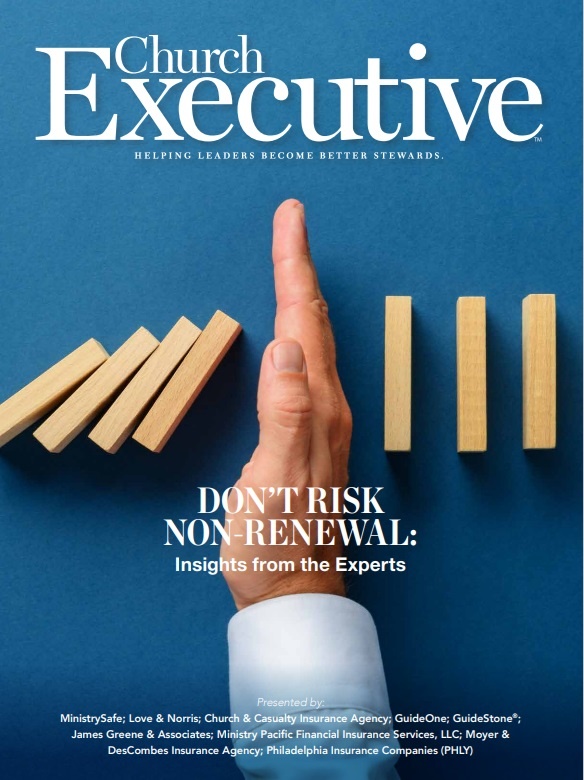
 In recent years, as headlines raise awareness on this important issue, churches are doing more than ever to protect the children in their care.
In recent years, as headlines raise awareness on this important issue, churches are doing more than ever to protect the children in their care.
Despite the best efforts to perform background checks and follow best practices to protect children and churches, insurance claims for sexual misconduct persist. Accordingly, the amounts and availability of insurance coverage related to sexual abuse and misconduct are getting tighter.

Manager, Relationship Management
Property & Casualty Team
GuideStone®
“When a church is putting clear, robust systems in place to care for and protect children and their congregation, there are insurance companies who can match their efforts with plans to resource institutions to respond should such a horrific misconduct occur,” explains GuideStone’s Megan Cuzen. “If a church is doing the bare minimum in the area of prevention, this in turn creates limits in coverage.”
So, what does doing better look like? Let’s find out.
Church Executive: Doing background checks simply isn’t enough (and never has been). What else must church leaders implement to really protect the children in their care?
Megan Cuzen: Beyond doing criminal background checks, churches should follow the two- or three-adult rule. By this, we mean having two unrelated people in the room working with children. Or, if your volunteers are spouses, it becomes three people, just for transparency.
An application must be in place for volunteers that includes at least two references per volunteer when screening: a character reference and a reference from the last church or ministry with whom they worked. From what I can tell, this isn’t happening enough.
Right now, to secure higher coverage limits, insurance companies need to see thorough, detailed policies and procedures like this in place — and that they’re regularly reviewed. Risk management shouldn’t just be policies on a bookshelf in the church office. It needs to be a culture you create where everyone is aware of — and following — those practices.
CE: At one time, failing to properly supervise convicted sex offenders on church grounds was a problem in many churches’ sexual abuse prevention efforts. Is this still the case?

Cuzen: Today we are seeing sexual abuse prevention at the forefront of ministries’ attention. Elders, deacons and leaders are asking questions and proactively pursuing knowledge on how to protect their congregation and vulnerable populations they serve in the community, especially children. If a convicted sex offender comes on the premises, the church should have very clear boundaries in place to prevent those individuals from being around children or other vulnerable people.
CE: Are you seeing many claims against ministries for improper reporting of child sexual abuse?
Cuzen: Again, I have seen ministries and churches doing a better job in this area. Churches are known for offering their facilities to the community for public use, and I have seen these ministries become more knowledgeable and prepared for the vulnerabilities this can create. Today, churches are following higher standards for proper documentation of allegations and quick reporting to appropriate authorities. Without these standards, institutions are now seeing that they will be held liable for someone else’s actions — and potentially could also face prosecution.
It can be a challenge for some churches to ensure consistency in prevention and reporting practices across different ministries and departments. Again, risk management needs to be a culture created across all your employees and volunteers, where the policies you have in place are routinely put into practice.
CE: In a previous article for Church Executive, GuideStone’s Cody Mankin asserts: “It’s time for ministries to be the Gospel standard.” Tell me more about that.
Cuzen: Love God, love others. At the end of the day, that’s what the church body exists to do.
This same standard applies to preventing sexual abuse. It requires listening to your vulnerable population and doing what you say you’re going to do: taking care of those in the church body.
CE: For a church that needs to “get its house in order” to avoid the risk of non-renewal by its carrier, what are your best pieces of advice?
Cuzen:It can be a challenge for some churches to ensure consistency in prevention and reporting practices across different ministries and departments. Again, risk management needs to be a culture created across all your employees and volunteers, where the policies you have in place are routinely put into practice.
And it bears repeating that criminal background checks are always important, but not enough on their own. Abuse prevention training and reference checks are crucial to making sure a culture of risk management permeates everyone working with children and vulnerable populations.
Finally, to make sure that you’re covering all the bases that need to be covered, I’d recommend having these policies reviewed by a legal team.
Megan Cuzen joined GuideStone® in 2010 and is a Certified Risk Manager® (CRM) and a Certified Insurance Counselor (CIC). She was named Brotherhood Mutual’s Rookie of the Year in 2012 and Agent of the Year in 2014. She has a bachelor’s degree in business management and a Master of Business Administration, both from Henderson State University . Cuzen is also a doctoral candidate at Dallas Baptist University, pursuing a Ph.D. in leadership studies.


